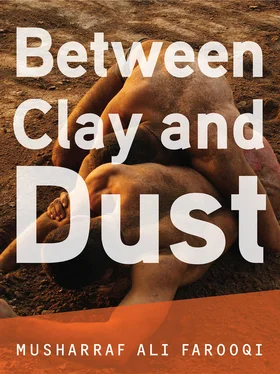“Why did you shut down the kotha, Gohar Jan?” Shukran asked. “If I had not run into your servant girl the other day, I would never have found out. In such silence, as if the whole affair was nothing. Who could have thought! And you let Malka fly away too. At least you should have made her pay for all the expenses you incurred in feeding and clothing her. If you had only let me know I would have brought ten men who’d have paid all that and more for her.”
Gohar Jan was saved from answering when Banday Ali brought in the bundle of clothes and gave it to Shukran.
“May God visit his mercies upon you, Gohar Jan! May all calamities be warded off from the head of you and yours!” Shukran said as she caressed the bundle of clothes.
Gohar Jan asked Banday Ali to see to it that the servant girl brought Shukran something to eat with her tea, and got up and left the room.
Experienced pahalwans occasionally tested how well a young champion remembered his skills when he was exhausted. On one occasion Tamami was challenged by a respected pahalwan of his clan soon after finishing his last grappling session with the trainees.
“Let us see what you have to show!” he called out, stepping up to Tamami.
Nodding in response, Tamami faced him.
After sparring for a few moments, the old pahalwan applied a drag to trip Tamami onto his back. His push triggered inside Tamami an impulse to strike back. He caught his opponent around the shoulders, with a violent shove threw him onto his back, and pinned him down by sitting on his chest.
Tamami instantly realized that humiliating the old pahalwan in this manner was offensive and wrong. When a junior pahalwan pinned down a senior adversary during a sparring session, he placed his hand lightly on his chest.
Tamami hastily got up and apologized to the old pahalwan.
His opponent said nothing.
Ustad Ramzi had watched the spectacle in silence.
Later, when Kabira asked Tamami about it, he could not explain why he acted with such unbridled rage. The fury that had been building up inside him had come out instinctively. He had often felt such impulses during recent grappling sessions, but the violence of his counter-maneuvers was dissipated by the combined force of the trainees attacking him simultaneously. Still, two trainees had dislocated their shoulders in the last few weeks.
❖
The news of Tamami’s violence in the akhara was questioned by the clan elders.
Ustad Ramzi had felt uneasy when Tamami sat on the old pahalwan’s chest, but he did not reprimand Tamami. The incident was an expression of Tamami’s training and not contrary to its focus. Ustad Ramzi designed Tamami’s exercise routines with an emphasis on subduing the adversary by force. They were based on his own estimation of Tamami’s ability.
Ustad Ramzi could not share his reasons with anyone. He told himself there would be time to correct it once Imama’s challenge had been thwarted. Yet, in his heart something bothered him.
When Kabira came by later that day and asked to have a word with him in private, Ustad Ramzi called him into his living quarters.
“What do you say about Tamami’s regime of exercises, Ramzi?” Kabira came straight to the point. “Now that he is doing well, shouldn’t you taper them down a little? His body needs some suppleness, too.”
“If he were unable to endure it, his body would not grow in size with every passing week,” Ustad Ramzi answered evasively. “He is preparing to defend the clan’s title. You know what happened the last time he fought Imama. We cannot take any chances.”
It was true that Tamami’s body continued to grow and without flinching he performed the new, harder tasks added to his routines.
Kabira regarded Ustad Ramzi intently as if he wondered whether Ustad Ramzi himself understood what he had said.
“Ustad Ramzi,” Kabira said, “I’ve known Tamami since childhood. What I see in his eyes I’ve never seen before. This exercise regimen is too harsh. Moderate it a little. Allow him a reprieve.”
Ustad Ramzi was uncomfortable with Kabira’s words.
“Strength may be mistaken, but the body never lies. I will taper down his exercises once the growth of his body is settled.”
“You can see that he is feeling the strain.”
“In that case he can speak for himself.”
“You know he would never say a word to you about it. He wants your approval.”
Ustad Ramzi made no answer.
Their conversation ended there and Kabira left.
❖
Kabira saw no reprieve in Tamami’s exercise routine in the days that followed. He did not accost Ustad Ramzi again. But one day he had a long talk with Tamami, and tried to persuade him to ask Ustad Ramzi himself to reduce his exercise load. Exhausted and under brutal strain, Tamami broke into tears from the affection and friendly concern he heard in Kabira’s words. Yet, he refused to ask Ustad Ramzi to relax his schedule and persevered with it.
Heavy rains fell on the inner city after a long dry spell, washing away the layers of limestone paint from the old buildings, exposing more patches of their brickwork. Water, which had united elements in the process of construction, now aided disintegration, allowing decay to make deeper inroads into the edifices. New cracks formed in the aged roofs and old walls. The groundwater rose. The old sewers overflowed and puddles of rainwater formed in the alleyways.
After many complaints were made, the municipal staff made preliminary rounds to check the situation and assess the damage in the tawaifs’ enclave, but in their sprawling, chaotic order of priorities the neighborhood had lost its place. They did not return to make any repairs or drain the water.
The suffocating humidity had ended with the rains, however, and Gohar Jan felt relieved since it made things a little more bearable.
One of the awnings of the Music Room suddenly fell one night. Upon hearing the noise Gohar Jan opened the door to the unlit room and saw the dust from the rubble clouding up the moonlight in the room. Disturbed in his sleep by the noise, Banday Ali followed her into the room to investigate its source.
Fortunately, the alley was deserted at that late hour, and nobody had been hurt from the falling debris. By afternoon the following day Gohar Jan had the fallen awning removed and asked Banday Ali to find someone to make the repairs.
Banday Ali summoned a mason who inspected the other awnings and found that they, too, had developed cracks. The awnings had to be repaired before the next spell of rain. Gohar Jan refused to go ahead with the repairs when the mason told her that the work would go on for a fortnight. She told Banday Ali that removing the carpets, and storing away and rearranging the furniture in rooms so that repairs could be made, would throw the whole place into disorder. She would attend to the repairs a few months later when she had the energy to organize everything.
Uncharacteristically, Banday Ali did not try to persuade her to carry out the repairs. It was the second time in recent days that he had not questioned her reasons for a decision. When Gohar Jan had announced to him that she had given up her morning riyazat, Banday Ali had similarly remained quiet.
It had been Gohar Jan’s routine for decades to get up before dawn. After saying her morning prayers, she would perform the riyazat until sunlight scaled down the courtyard walls and it was time for Banday Ali to bring her tea.
When she had fallen sick and Banday Ali had asked her to rest, she had told him, “If I give up the riyazat I will not find the strength to carry on with my life.” Recently she had been ill again. When Banday Ali again insisted that she could not cope with the exertion of both her morning riyazat and the evening recital she held for Ustad Ramzi, Gohar Jan gave up her morning ritual instead of asking Ustad Ramzi to end his visits.
Читать дальше












